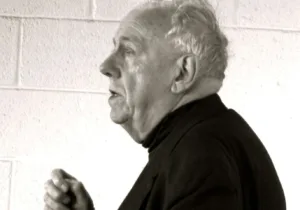The Greek philosopher Aristotle included courage among the virtues – those character traits that serve as markers of moral excellence. Like all the virtues, courage is a mean—a golden mean, the perfection found between the vices of excess and deficiency. If one has too little courage, they suffer the desiccated vice of cowardice. Just so, an excess of courage is really the bloated vice of recklessness.
Aristotle asserted that the courageous person fears only things that are worthy of fear. Further, the courageous person knows not only what to fear, but how to respond appropriately to—and despite—that fear.
To be sure, it’s possible to fear more than one thing at exactly the same moment. I might fear drowning, but I also fear losing my child to the riptide that has just pulled her far from shore. In such cases an understanding of the duties and responsibilities attendant to being a father should make clear that I mortify my fear of drowning and do whatever is necessary to save my daughter.
Returning again to Aristotle, the key to understanding that my assessment of this little case study in courage is true relies on recognizing that the virtues are aimed at achieving human excellence and genuine human happiness. To say that virtue is aimed at happiness is to say that it is aimed at human flourishing. It must be remembered that human beings can truly flourish only in very particular ways. When it comes to the acting moral agent, flourishing has little—or perhaps nothing—ultimately to do with the body. Human happiness has everything to do with the condition of our soul. The soul flourishes when its activities correlate with the character of the Divine, in Whose image we were made and intended to live. When human beings do that which God made them to do, then, and really only then, can they truly be happy.
When it comes to courage, this rather ambivalent attitude toward our physical condition in favor of the character and health of our soul is essential. It is better for our soul to flourish than our body. Life is a good, but it is not the ultimate good. It is, as it has been said, better to be a dead lion than a living dog.
Paradoxically, perhaps, the Christian duty of neighbor love includes concern for their physical welfare. When the innocent are under assault, the courageous and loving person comes to their aid – in whatever manner the context demands. The recent release of video footage of the shooting at Robb Elementary School in Uvalde, Texas suggests a grotesque abdication of both love and courage on the part of law enforcement officers that exacerbated the tragedy of an already tragic situation.
The video shows that within about three minutes of the gunman firing his first barrage into the child-filled classroom, a small team of police officers rush toward the classroom. They crouch, advancing toward the classroom, before a burst of gunfire from the assailant sends them retreating back down the hallway.
What follows is a 77-minute period in which an increasing number of local, state, and federal officers, heavily armed, some in armor, some with ballistic shields, do a whole lot of preparatory things, or some really nothing at all, but not entering or attempting to enter, the classroom.
I am not discounting the terror the police officers must have felt nor the psychological or institutional conditions that led to large group inaction. I also realize it is not surprising that officers who might never have been shot at before would be overwhelmed by direct gunfire aimed at them. It is likely that most of them were not adequately—or consistently—trained to handle such situations. But I really don’t care about any of that because it doesn’t really seem relevant.
I have written before about courage in the context of law enforcement. The framework I presented there remains relevant:
Looking at this through a Christian realist lens, we see that the police officer’s mission closely corresponds to the just war aim of promoting the order, justice, and peace of the political community. Under the influence of just war tradition, commanders establish rules of engagement based on a three-pronged set of commitments: to force protection, non-combatant immunity, and mission effectiveness. Context determines how much stress each commitment is given. This might change not simply from mission to mission but at any given moment within any given mission. There are times when the mission is relatively non-essential, and a commander might willingly abandon it—willingly taking a fail—if the danger to his forces or non-combatants is incommensurately severe. At other times, the mission might well be so essential that a commander will willingly—though regretfully—spend the lives of all her forces, or greatly endanger the lives of the innocent, to secure victory.
The police knew that shots had already been fired. Indeed, in the course of their 77-minute inaction, additional shots were fired in the classroom. They knew there were wounded victims and dead children—if nothing else, a child’s 911 call from inside the classroom confirmed that. The mission was clear – only aggressive action to neutralize the murderer was acceptable. Children were bleeding out. And well-armed grown men did nothing.
I do not really know what accounts for the cowardice that is evident in the hallway. Certainly there appears to be shocking command failures. There were failures, as well, in those officers who knew better and yet failed to disobey orders that they stand down. To defy such orders would have taken courage, to be sure. But courage is what was needed throughout that tragedy. And courage was lacking everywhere.
Christians, more than anyone else, have a long history of moral resources on which to draw to help us form our sons and daughters into the kinds of men and women who do not stand idly by in hallways while the innocent are slain or terrorized. The film The 3:10 to Yuma provides just such an understanding of the heroic.
The old Western tells the story of Dan Evans and Ben Wade. Evans, a poor rancher with a dying herd, accepts a contract to escort Wade, a murderous outlaw, on a train bound to the prison in the town of Yuma. The drama, of course, involves their getting to the train at all. Wade’s men are sure to try and rescue their leader. Evans is in grave danger, and he knows it.
The film’s opening sequence sets the theme. Evans and his young sons are trying to round up their grazing cattle when they happen upon a stagecoach robbery. Wade’s outfit apprehends Evans and threatens him against intervening. Later, back at the ranch, Evans’ wife is distraught to hear the story.
“It’s terrible,” she says, “that something bad can happen and all anybody can do is to standby and watch.”
Her husband, shamed, responds: “Lot’s of things happen, and all anybody can do is watch.”
“But to have you standby. To have the boys watch you.” Evans’ wife doesn’t mean to belittle him, but her words wound him.
What follows is, in classic Western style, a reflection on how justice and order—and therefore peace—can be wrestled out of a harsh and unyielding world characterized by rank injustice where neighbor preys upon neighbor. Through an unexpected turn of events, Evans participates in the opportunistic capture of Wade and, for the princely—and ranch-saving—sum of $200, agrees to escort Wade to Yuma.
In the film’s climax, a final confrontation between Wade’s men and those who mean to get Wade to prison is about to unfold. Cowed by the prospect of the impending violence, most of those on Evans’ side abandon their duty and run away. In a moment much like Abraham’s bargaining with God over Sodom, Evans bemoans that in the entire town around him, he is unable to find even five—not even five—brave men who will stand with him. So he must make a choice. Everyone around him tells him to simply let Wade go. In the end, however, Evans’ refuses, and insists on taking Wade to the Yuma prison: “I’ve got to” he insists, “Honest to God, If I didn’t have to do it, I wouldn’t.” But he’s no longer doing it for the money. Revealing the purpose of his resolve he proclaims, “People should be able to live in decency and peace together.” And so bad men must be brought to justice.
You can always tell a hero by the direction they are running.
The tragedies in Uvalde—the one that occurred in the hallway as much as the one in the classrooms—remind us that to say that the virtues are key to human flourishing is to say something true not only of the virtuous person but of his or her neighbors as well. Frightened or not, the good must stand between the innocent and the wolves.







 Sponsor a student for Christianity & National Security 2024
Sponsor a student for Christianity & National Security 2024